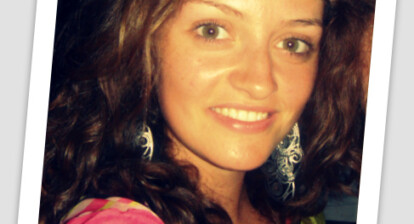 Name: Anna
Name: Anna
Age: 21
Hometown: Joensuu
Country: Finland
EUSTORY experiences: Youth Academy in Switzerland 2010, Alumni project “25 years after Chernobyl” in Berlin 2011
Actual occupation/studies: Studies European Law and Administration of Integration and German and English in the University of Eastern Finland and also works as a journalist in newspaper Karjalainen.
The 21 years old Anna Sievälä comes from Joensuu, which is a rather small town in the Eastern Finland. One cannot visit this part of Finland without trying a traditional pastry called Carelian Pie. Another insider tip of Anna is the Summer Rock Festival in Joensuu.
She enjoys travelling above all. In January/February 2012 she made an Interrail trip and visited many of her EUSTORY friends in two weeks – how great is that?! And her other newest hobby is baking cakes – the only problem with this hobby is finding some people who’d eat all the cakes, she adds. I would know some volunteers to help her, no?!? Anna also appreciates the chance to experience “pure nature” in her home country, which is also valued by most of the Finnish people. Aside from this “longing for nature” some other things that make the young Anna Finnish are her sense of independence and a certain need for her own space. But what makes Anna European?
She shared that in Finland, being or feeling “European” can sometimes be difficult: “Very often the Finnish perspective towards Europe is to look at it from the outside, as if we wouldn’t be a part of it. In many ways Finland and Finnish people do differ from many other European nations: our culture and traditions don’t have nearly as long history as the central or southern Europe, and by many means we rather identify ourselves as “Nordic” rather than “European”. To me being European is not only the long history and shared traditions, or even being geographically close to each other. Of course especially history forms a strong basis for Europe, and to me a part of being “European” is being familiar with this history – and its effects also on today’s life. For example: even though Finnish people weren’t around when the idea of democracy was developed.” Anna explains that from historical point of view Finland has been independent only since 1917, that means less than 100 years. Before the independence they were under Russian rule for more than 100 years and before that under Swedish rule for several hundred years.), “Today it is a vital and central part of our society. In everyday life, though, being “European” is something more concrete. It is the possibility to co-operate with people from other European countries, it is the freedom to travel to other European countries, it is being interested in other European countries and in what’s going on in Europe, for example by following the news.”
When I asked Anna about her experience with EUSTORY she said that: “EUSTORY has brought history closer and made it more concrete to me. Through EUSTORY I have understood more clearly than ever, that history is not in the books – it is in people’s experiences.” Thus, EUSTORY has changed her point of interest in history: now she is firstly interested in knowing, how historical events have affected people, how they have lived through them.
So far Anna’s best moment with EUSTORY has been in Berlin, where as a part of the 25th “Anniversary” of Chernobyl she got to make a theatre performance about Chernobyl. For her, being a part of that performance meant winning herself. It was also great to make the performance in front of an audience, where there were also people, who had personally experienced the accident.
Nationality has nothing to do with personality – this is the conclusion of Anna after numerous conversations with fellow Eustorians. Discussing with people from different European countries has opened her eyes in two ways. Firstly, people are surprisingly similar all over Europe (probably all over the world). You can find a person who shares your views and interests from a completely different country while a person coming from your own country can be the complete opposite of you. Secondly she has noticed that the European countries themselves are very diverse. Things which she might take for granted, such as democracy and social security, are not a part of nearly every European country.
Anna’s recommendation for a new EUSTORY debate goes also to a similar direction: Freedom of speech – does the media and people have freedom to express themselves? What is propaganda and censorship in today’s Europe?
As Anna’s joke proves – Finnish people like most of the Europeans tend to laugh mostly about their neighbours: “A Finn, a Swede and a Norwegian were competing on who could stay in a haunted house for longest. The Norwegian went in the haunted house. When he had been there for ten seconds, he heard a voice saying: “Red eyes, red eyes.” He ran out. The same thing happened with the Swede. The Finn went in, and after 20 seconds he heard a voice saying: “Red eyes, red eyes.” The Finn said back: “Shut up or you’ll have a black eye.” The ghost ran out.”
Good for the ghost since, as Anna confirmed, Finnish people do not make promises if they don’t intend to keep them.




